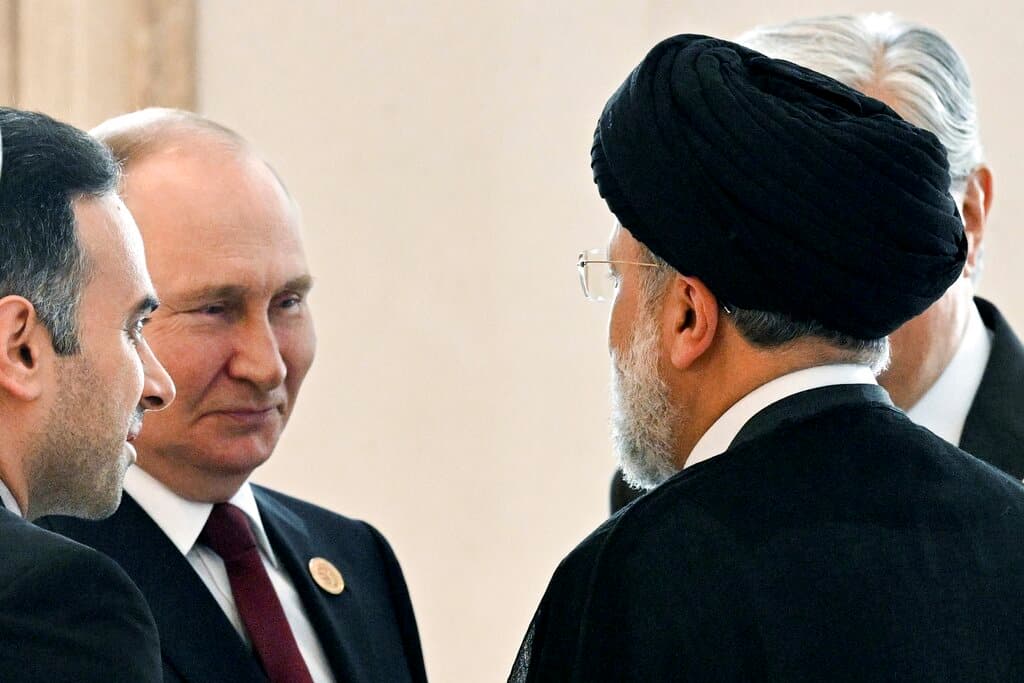Biden Goes Easy on Moscow’s Ally Tehran, Even as He Talks Tough on Russia
‘Why is this administration funding both sides of this war?’ Senator Cruz asks Secretary Blinken.

With President Biden talking tough on Russia’s aggression in Ukraine even while his administration walks on eggshells around Moscow’s ally in Tehran, Washington increasingly seems eager to rob the Kremlin’s Peter to pay Ayatollah Paul — even as Iran assaults Americans.
“The U.S. is not seeking conflict with Iran,” the national security council spokesman, John Kirby, told CNN Friday. A day earlier, an Iranian-made drone operated by a Tehran-allied group attacked an American base at Syria’s al-Omar oil field, killing a contractor and injuring five American servicemen.
In response, the Pentagon targeted the Syrian affiliate of Iran’s Islamic Revolutionary Guards Corps that carried out the Thursday attack. The group then followed with a missile attack on the al-Omar base Friday, this time with no casualties. “We will always take all necessary measures to defend our people and will always respond at a time and place of our choosing,” an Army general said in a statement.
The general is Erik Kurilla, who oversees our GIs in the Middle East. Would the Pentagon’s place of choice now include the head of the octopus, the IRGC, rather than, as it has so far, merely its many regional arms? For now, retaliating against targets beyond Syria would be out of character: Still seeking a return to the futile 2015 nuclear deal, Washington is in no mood to go after the Islamic Republic.
“Joe Biden’s diplomats are pressing the UK Government not to formally declare Iran’s Revolutionary Guard a terrorist group, despite the home office backing the move,” the British Telegraph reported this week. This even as America itself lists the IRGC as a terrorist group, and while exiled Iranian anti-regime leaders are pressuring several European countries, including Britain, to follow suit.
The Biden administration, additionally, just signed a waiver that allows the transfer to Iran of $500 million held in an Iraqi bank as part of the American sanctions on the Islamic Republic, the Free Beacon reports Friday. Such sanction waivers became a hot topic during a Senate Foreign Relations Committee hearing on Wednesday.
Senator Cruz, after commending Secretary Blinken’s commitment to defeating Russia in Ukraine, nevertheless added, “I’m deeply concerned, however, that no matter how you want to help Ukraine, there is something the Biden administration wants more, which is to re-enter a nuclear agreement with Iran.”
Mr. Cruz cited the administration’s failure to effectively enforce an oil embargo on Iran, which he said directly helps fund Russia’s Ukraine war, as well as waiving congressional sanctions targeting Russian-Iranian nuclear cooperation.
Under the 2015 Joint Comprehensive Plan of Action, Iran was instructed to transfer to a foreign country all of its low-enriched uranium beyond the quantity authorized in the agreement. The United Nations Security Council resolution that endorsed the JCPOA specified that country to be Russia. In reality, following an initial such transfer in 2015, Iran all but quit the practice.
Instead, Tehran tightened its nuclear cooperation with Russia. Most recently, Russia secretly agreed to return to the Islamic Republic whatever enriched uranium it received from Iran. It is also said to help Iran’s nuclear arms program in other ways while Tehran supplies kamikaze drones and other arms to support Moscow’s Ukraine war.
Yet, when confronted about Iran’s nuclear cooperation with Russia, Mr. Blinken fell back to citing the letter of the JCPOA law. Waivers he has signed regarding congressional sanctions on that cooperation, Mr. Blinken told Mr. Cruz, are “in the nonproliferation interest of the United States.”
That answer “does not pass the laugh test,” Mr. Cruz said. “Russia is on the side of Iran, and Iran is on the side of Russia. They’re both against us.”
Holding an open door to a “nuclear deal that deepens Russia’s involvement in Iran’s nuclear program and enhances military and economic ties between them is the height of folly, especially amid a renewed era of great-power competition,” an Iran watcher at the Foundation for the Defense of Democracies, Behnam Ben Taleblu, tells the Sun.
Meanwhile, the chairman of the joint chiefs of staff, General Mark Milley, told Congress Thursday that once Iran decides to do so, it “could produce fissile material for a nuclear weapon in less than two weeks.” At the same time, while American troops are attacked in Syria, the Pentagon only retaliates against Tehran’s local proxies, while shying from hitting IRGC Iranian bases.
Going easy on Iran while America funds Ukraine’s war against Russia makes little sense, Mr. Cruz says. “The billions of dollars the ayatollah is getting because of your decisions, and President Biden’s decisions are funding the war in Ukraine,” he told Mr. Blinken. “Why is this administration funding both sides of this war?”

